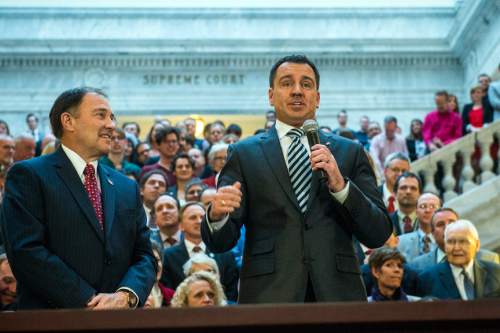This is an archived article that was published on sltrib.com in 2015, and information in the article may be outdated. It is provided only for personal research purposes and may not be reprinted.
Lawmakers have found a fix for Utah's discredited state school board election law — but because Gov. Gary Herbert turned down a request for a special legislative session, it'll have to wait, according to House Speaker Greg Hughes.
In a Friday email to members of the House, the Draper Republican said Herbert's "non-decision" proves that the governor is not swayed by support or opposition of lawmakers on a particular issue, even one that has majority support in both the House and Senate.
"Perhaps the governor's staff would prefer a state school board elections bill creating the option to use that time-tested solution of Rock-Paper-Scissors," Hughes wrote.
Utah law calls for state school board candidates to be vetted by a nominating committee and ultimately placed on the ballot by the governor.
Last year, a lawsuit filed by rejected school board candidates resulted in U.S. District Judge Clark Waddoups ruling that the selection method violates constitutional guarantees of free speech, giving committee members "unfettered discretion" to approve or deny candidacy.
Waddoups did not strike down the law, but instead returned the rejected candidates to the ballot while suspending the lawsuit to let legislators create a new election method.
Several proposals were sponsored during the 2015 legislative session, but disagreement on whether board elections should be partisan, nonpartisan or abandoned in favor of gubernatorial appointments led to an impasse between the House and Senate.
Herbert announced last week that due to Waddoups' ruling, he would not form a nominating committee to screen candidates for the 2016 elections.
"The governor encourages legislative leaders to continue working together to find a resolution to this important issue," said Jon Cox, Herbert's spokesman.
In his email to lawmakers, Hughes said a solution was crafted in recent days that would have preserved the nominating committee by making technical changes to the law and resolving Waddoups' concerns.
He said selection committees have played a role in school board elections since 1991 and "though the Legislature has amended the statute from time to time, it has remained a good process."
Hughes wrote in his email that it was unfortunate the governor did not agree with the approach of lawmakers. He also alluded to a breakdown in communication between Utah's legislative and executive branches.
"It was interesting that the governor called upon the Legislature to act on this important issue through a press release, when a direct conversation might have been a better way to make the point," Hughes wrote.
House Minority Leader Brian King, D-Salt Lake City, said he, too, would have preferred a direct conversation — with Hughes, rather than hearing about an apparent election fix through a mass email.
"With regard to gaining majority support in the House," he said, "that has not been something that anyone from the leadership or anybody from the other side of the aisle has run past me."
King pointed to the recent failure to expand Medicaid in Utah — when Hughes relied solely on Republican votes — as a continuing trend in which minority House members are shut out of debate.
He said Hughes' position as House speaker is meant to represent lawmakers in both parties, not just members of the majority caucus.
"If the speaker wants to claim to be speaker of the whole House," King said, "it seems to me that he needs to do a better job of communicating with the 12 members of the minority caucus."
Without a special session, Senate President Wayne Niederhauser said, the time may have run out to put a new election method in place for 2016.
The Sandy Republican said there was majority support among senators for a temporary solution, which would mitigate the discretion of the nominating committee by adding criteria to the candidate vetting process.
That proposal included a one-year sunset to allow the 2016 election to proceed while lawmakers continued debate on partisan, nonpartisan or appointed school board systems, Niederhauser said.
"We would need to really come back and try to deal with one of the three issues and find a sweet spot both houses could agree on," he said.
During his monthly KUED news conference on Thursday, Herbert spoke in favor of allowing a nonpartisan election to go forward in 2016, with a primary election taking the place of the nominating committee.
Cox, Herbert's spokesman, said adding state school board races to June's primary election would empower voters and mirror the nonpartisan school board elections held at the local school district level. "In [Herbert's] opinion, the easiest path forward is a simple narrowing of the ballot," Cox said. "The only change that would need to take place is a primary."
Twitter: @bjaminwood



